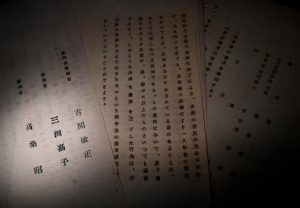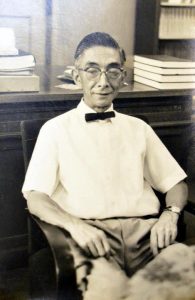Striving to fill voids in Hiroshima, unfinished judgment, Part 12: Verdict
May 4, 2024
First legal judgment declaring use of atomic bombs to be “illegal”
On December 7, 1963, spectator seating for the public in the Tokyo District Court was packed with reporters. Toshimasa Koseki, the judge presiding over the case, was set to announce the verdict in the high-profile “A-bomb trial.” Akira Takakuwa, who is now 87 and lives in Tokyo, was in the same courtroom as a judge in the case. “It took a lot of nerve,” he recalled. Yoshiko Mibuchi, the other judge who wrote the decision with the two other judges, was unable to be in attendance, as she had been transferred to Tokyo Family Court.
After the courtroom opened at 10 in the morning, Presiding Judge Koseki began with the reasoning behind the judges’ verdict before reading the main text of the judgment explaining the conclusion. Although he never heard from his father about that time, Mr. Koseki’s oldest son, Hiroaki, 73, a resident of Kashiwa City in Chiba Prefecture, explained, “My father had a strong sense of justice. When I was a child, I remember him telling me strongly to ‘never tell a lie.’”
Mr. Koseki ruled that the atomic bombings of Hiroshima and Nagasaki were a violation of international law, citing two reasons — the indiscriminate nature of the bombings, which caused damage even to non-military targets and non-combatants; and the cruel nature of the weapon, which caused “unnecessary suffering” due to radiation effects from the bombings that lingered even after the war. The two main principles of the illegality of nuclear weapons’ use still known today were first presented in that ruling.
Urged government to provide sufficient relief measures
On the other hand, in the final main statement, the ruling dismissed the plaintiffs’ claim for damages because it asserted that individuals, as opposed to states, have no right to claim damages under international law. Although the decision was based on the opinions of international legal experts, it was an absurdity from the perspective of victims of the illegal attacks and the bereaved families of those who had died.
However, the impressions and opinions of the judges were included in the decision, which was an unusual situation. Referring to the insufficient support provided by the former Atomic Bomb Medical Relief Law enacted in 1957, which required the provision of free medical examinations to the atomic bomb survivors, the ruling urged Japan’s government “to provide sufficient relief measures, which should go without saying.” The ruling also stated that preventing the horrors of war was the “common hope of humanity.”
The reading of the verdict took about 30 minutes. According to a newspaper article at the time, the face of Yasuhiro Matsui, the plaintiffs’ attorney who had been taking notes, glowed as he listened to the decision. After Mr. Koseki left the courtroom, reporters in the gallery seats were abuzz.
Several of the evening newspapers reported the news at the top of their front pages, announcing the world’s first judicial verdict declaring “A-bombings are violation of international law,” despite the fact that the plaintiffs had lost the case.
Joyful voices of plaintiffs
Mr. Matsui also thought deeply about the significance of the judgment. While he was disappointed that the claim for compensation had been dismissed, he praised the verdict in a letter to those involved in the case. “It has given great courage to people around the world who long for peace,” he wrote.
It took about eight-and-a-half years from the filing of the lawsuit to its conclusion. During that period, one of the five plaintiffs died. Ryuichi Shimoda, one of the plaintiffs who experienced the atomic bombing of Hiroshima, expressed his joy in a letter to Mr. Matsui that the court had declared the atomic bombings to have violated international law.
“I believe the survivors of the atomic bombings and the victims in their graves are rejoicing,” he wrote.
While disappointed that the claim for damages had been dismissed, A-bomb survivors groups and others welcomed the trial’s outcome. The court’s decision also influenced debates in Japan’s Diet.
(Originally published on May 4, 2024)









